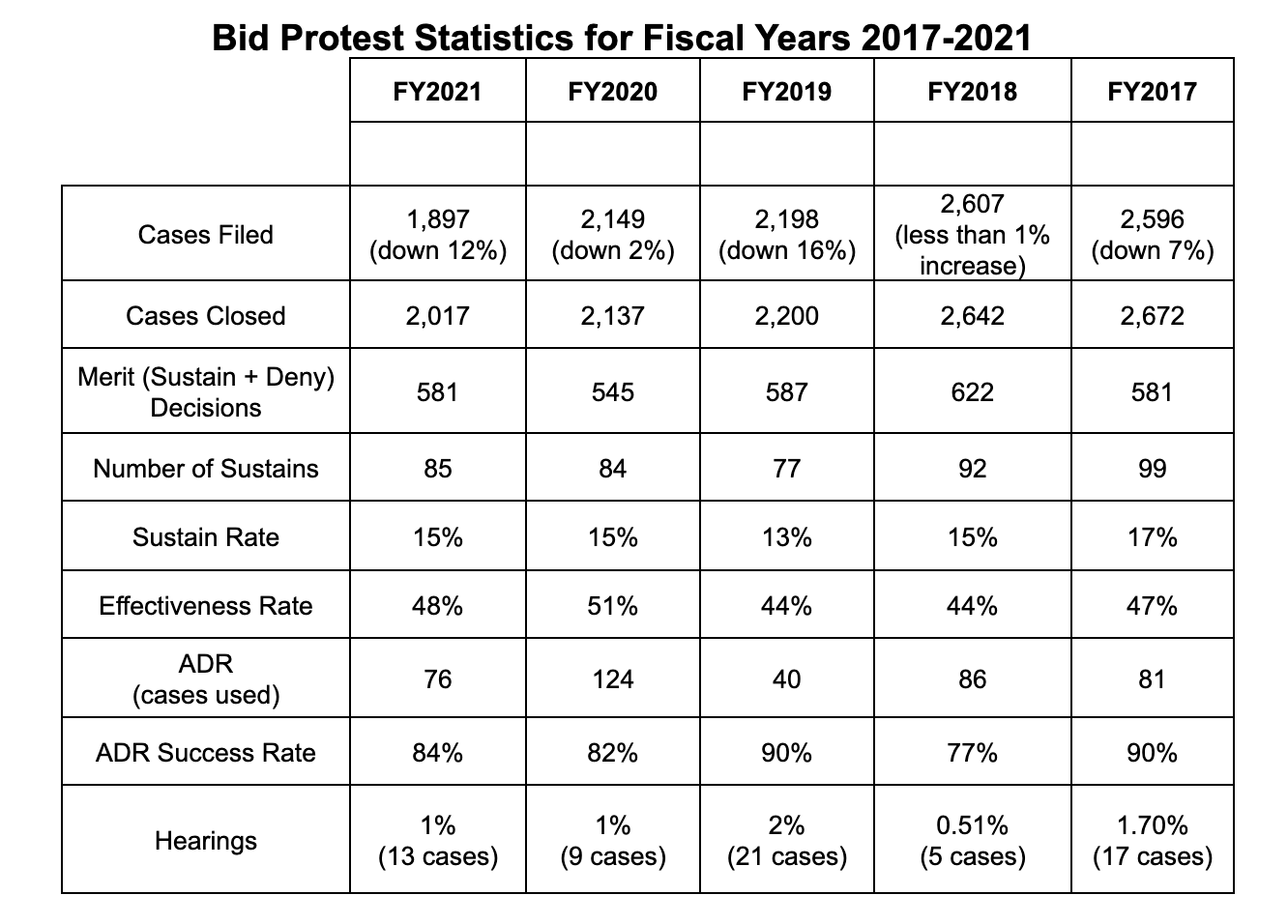
Michał Chodyra / iStock.com
5 Key Takeaways From GAO’s Latest Annual Report on Bid Protests
Statistics indicate that nearly 50% of protests are effective.
Federal contractors may be wondering whether it is worthwhile to file a bid protest, and what their chances of success are if they choose to challenge a contracting decision. The Government Accountability Office’s latest bid protest report to Congress—required annually under the Competition in Contracting Act—provides federal contractors a snapshot of GAO’s bid protest metrics for the 2021 fiscal year, along with data on the previous four fiscal years for comparison. Below is a five-year retrospective summary of GAO’s bid protest statistics, followed by five major takeaways from the fiscal 2021 report.

Source: GAO Bid Protest Annual Report to Congress for Fiscal Year 2021
- The protest effectiveness rate remains high. Although showing a slight decrease from the record-high 51% effectiveness rate in fiscal 2020, GAO’s 48% percent effectiveness rate for fiscal 2021 (the rate at which a protester obtains some form of relief at GAO as a result of either a sustained protest or voluntary agency corrective action) continues to outpace the average effectiveness rate over the past five fiscal years (46%) and the 10-year average of 45%.
- Case filings continue to drop. Of the 1,897 cases filed in fiscal 2021, bid protests accounted for 1,816 of the filings, compared to 2,052 protests filed in fiscal 2020. The remainder of the cases filed during fiscal 2021 constituted costs claims (43 filings) and requests for reconsideration (38 filings). Compared to fiscal 2020, the total number of fiscal 2021 cases filed dropped by 12%, representing a significant drop from the high of 2,789 cases filed in fiscal 2016 and continuing the downward trend in case filings beginning in fiscal 2019. A key factor in the drop over the past two years can likely be attributed to the continuing impact of the COVID-19 pandemic. However, another potential factor may be the mandatory use of enhanced debriefing techniques in Defense Department procurements, as this process is intended to provide disappointed bidders with a better understanding of Defense’s evaluation process so that a would-be protester can more effectively weigh potential protest grounds.
- The rate of opinions that sustain bid protests on the merits remains consistent. The GAO’s rate of issuing written decisions that sustain protests on the merits remained at 15% for fiscal 2021—reflecting a consistent hover between 13% and 17% in three of the last five fiscal years. The most common bases for sustaining protests in fiscal 2021 were: unreasonable technical evaluation; flawed discussions; unreasonable cost or price evaluation; and unequal treatment. Even though “unreasonable technical evaluation” and “unreasonable cost or price evaluation” have remained the most prominent grounds of successful protests over the past few years, this appears to be the first year that “flawed discussions” has been included as one of the top four protest grounds. On the other hand, two of the most commonly successful protest grounds from the GAO’s fiscal 2020 report—flawed solicitation terms and unreasonable past performance evaluation—did not make the fiscal 2021 list. Remember, the low sustain rate is somewhat deceiving because—as noted above—the overall effectiveness rate for fiscal 2021 sits at 48%, some 33 percentage points higher than the sustain rate.
- Protests of task and delivery orders represent a sizeable portion of GAO’s docket. Of the protests filed in fiscal 2021, 401 concerned task and delivery orders, thus constituting a significant portion (22%) of all protests filed this past fiscal year. The percentage of task and delivery order protests as a part of all protests filed in fiscal 2021 continued its gradual increase over the past two years: in fiscal 2019, these types of contracts accounted for 18% of all protests; in fiscal 2020, task and delivery order protests accounted for 20% of all protests. This percentage increase remains surprising based on the current GAO jurisdictional threshold of $25 million for protests of Defense Department task and delivery orders, but it may be better explained by the overall decrease in fiscal 2021 and 2020 case filings, as, despite the increased percentage of fiscal 2021 task and delivery order protests (as a portion of all protests), the number of task and delivery order protests in fiscal 2021 (401) decreased from the prior fiscal year (419).
- Alternative dispute resolution was slightly more successful and hearings increased. While the GAO employed alternative dispute resolution in fewer cases during fiscal 2021, the process was slightly more rewarding for protesters this past fiscal year, with a success rate of 84% compared to the fiscal 2020 success rate (82%). The number of hearings actually increased in fiscal 2021 (13 compared to nine in fiscal 2020) but were held in only 1% of the cases filed, thus continuing GAO’s rare use of hearings in litigating protests.
The GAO bid protest process continues to offer federal contractors a remarkably consistent chance (nearly 50%) for some type of relief—likely in the form of an agency’s voluntary decision to take corrective action. Even when corrective action is taken, protesters must keep in mind that ultimate receipt of the contract award is not guaranteed, as agencies have a wide degree of latitude in fashioning the corrective action. Still, an agency’s voluntary decision to take corrective action almost half of the time supports our view that protests remain a very useful tool for contractors.
Ethan Brown, an associate in the Washington, D.C. office of McCarter & English LLP, has extensive experience advising defense, healthcare, construction and technology companies on a variety of government contracting matters at the federal, state and local levels. He can be reached at ebrown@mccarter.com.
NEXT STORY: OPM Faces Uncertain Funding Prospects






